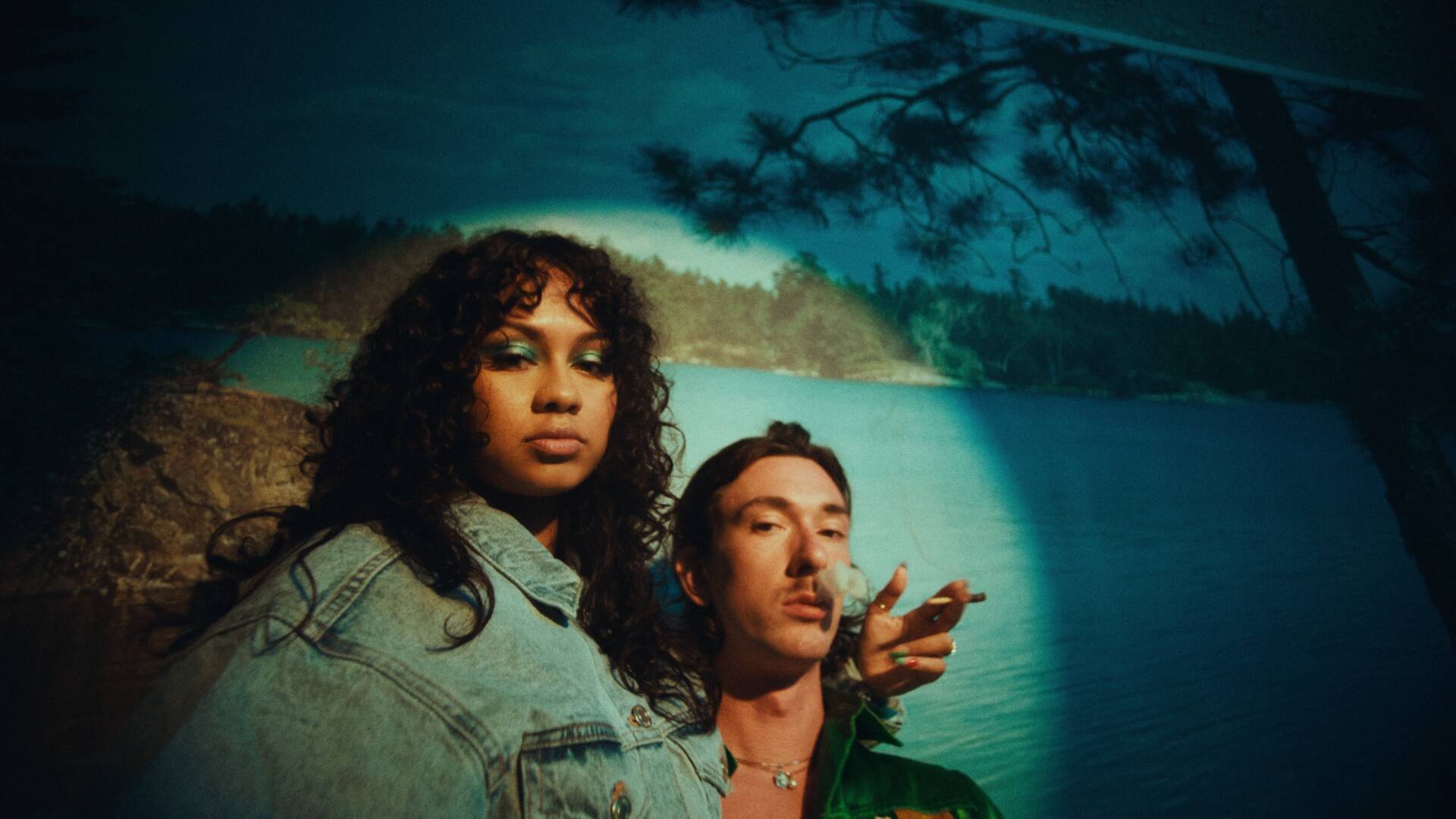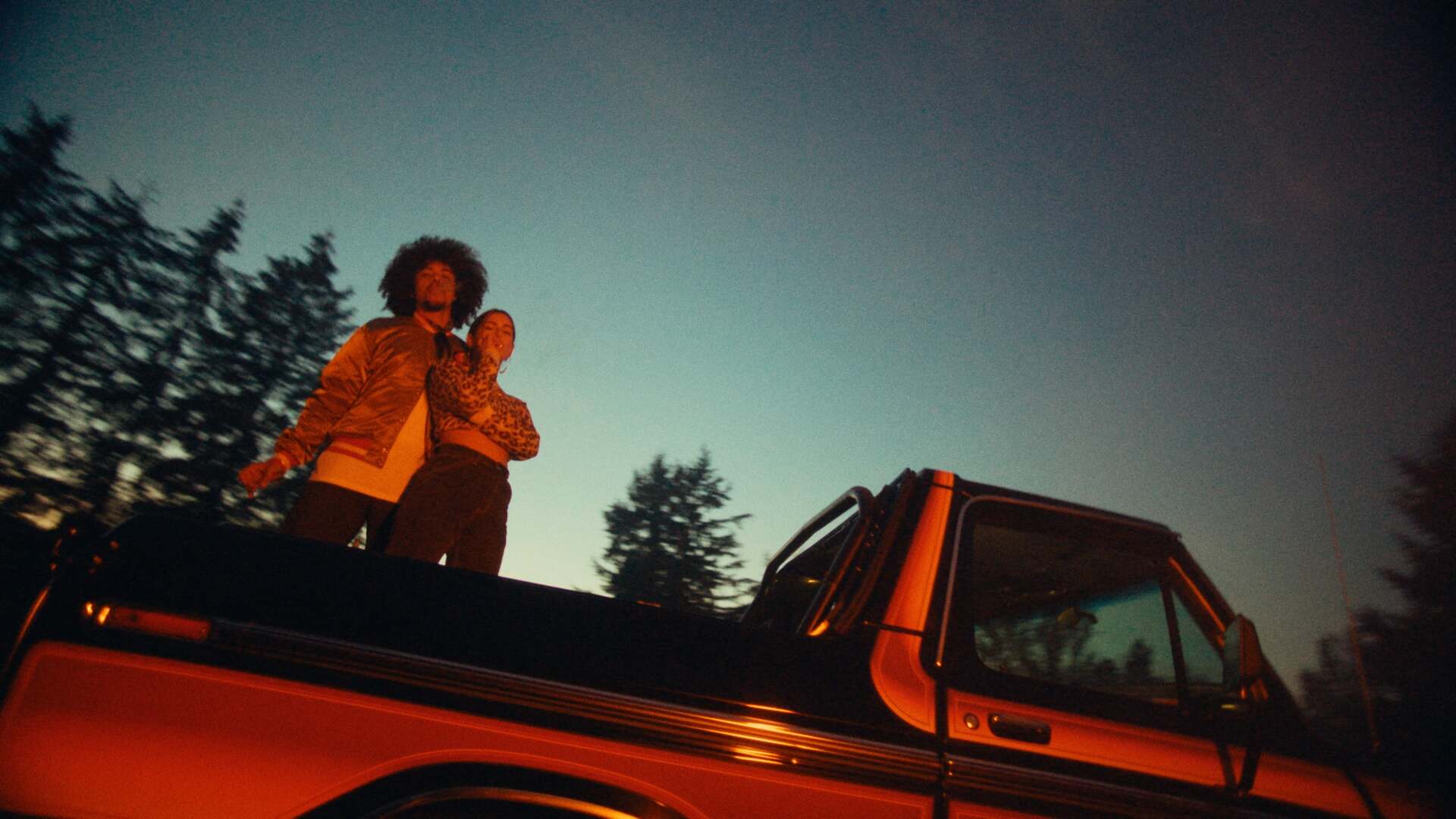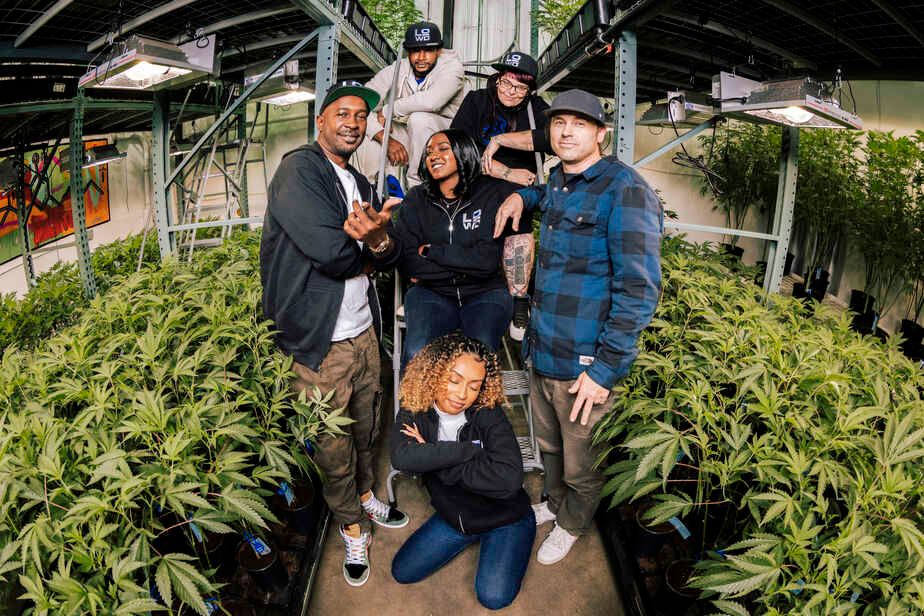The cannabis conversation got even louder and more positive this season, as the award-winning company LOWD unveiled their short film LOWD Vibes Only. Founded by industry visionary Jesce Horton, the Oregon-based LOWD is known for embodying the art of “urban craft cultivation.” LOWD Vibes Only, which took home a Silver CLIO Award in February, played with the tropes of classic tourism ads to incorporate diversity, modern aesthetics, and scenes that brought the brand’s “Smoke Like a Grower” tagline to the forefront.
Team Honeysuckle has been following Horton’s successes in the industry for years, so we were privileged to sit down with him and get the inside scoop on the film, the upcoming developments at LOWD, and what’s on track for Oregon’s social equity program.
Jesce Horton: Chief Executive Officer at LOWD & Co-Founder of the Minority Cannabis Business Association (MCBA)

Jesce founded LOWD after experiencing successes in medical cannabis cultivation. He then co-founded the Minority Cannabis Business Association (MCBA), the largest non-profit organization developed to create equal access and economic empowerment for cannabis businesses and patients in the communities most affected by the war on drugs. Jesce’s on the board of directors for the Oregon Cannabis Association, and the Resource Innovation Institute (RII).
He has also served on numerous federal, state, and local cannabis regulatory advisory committees to help shape the legal cannabis markets in both Oregon and California. Along with his wife Jeannette Ward Horton, another cannabis industry pioneer, Jesce founded the non-profit organization NUProject, a historic initiative partially funded by the City of Portland since 2019. NUProject helps cannabis business owners and career hopefuls by providing them with grants, loans, educational resources, job matching assistance, and entrepreneurial services.
Based out of Portland, Oregon, LOWD produces award-winning cannabis and embodies the intersection of urban culture and epic nature unique to the city. LOWD's motto, “Smoke Like a Grower,” highlights that for this company, the best thing about being a cannabis grower is smoking like one.
LOWD Takes Home Silver Clio for Mood Film ‘LOWD Vibes Only’

LOWD's motto “Smoke Like a Grower” also encompasses its purpose and drive in the cannabis industry. For that reason, they decided to create a film — LOWD Vibes Only — that properly captured that purpose. The film focuses on the perspective of LOWD consumers and the world they live in. The customer base of LOWD lives at the crossroads of urban and nature. Portland, Oregon, is the embodiment of that cross-section.

Brandon Drew Jordan Pierce, Partner and Chief Creative Director, called the project, "A wavy as f*ck film bigging up Portland, our flower, with a score from two trap music monsters in Teddy Walton and Aaron Bow who have done joints with everyone from Ye to Cudi to Kendrick to Doja in no particular order.”
LOWD Vibes Only plays like a modern version of classic 1950s tourism ads, inviting people to come to Portland to enjoy the city and, most importantly, "some bomb a$$ LOWD weed." The classic 1950s voiceover is juxtaposed with wavy imagery, styling, and dynamic cinematography to truly represent the LOWD lifestyle on film.

Pierce, the creator behind Hulu’s series Your Attention Please, is known for bringing stories of Black excellence to the public conversation. He and the Grammy award-winning producer Walton and super producer Bow ensured that LOWD Vibes Only would rattle viewers’ headphones and speakers.The LOWD crew and Pierce collaborated with the director team, The Vortex, and editor Man Ferraz from Cut n Run for the film. Sammy Jo Alonso, co-founder of vintage store Fruition, was on set to style the team. The film helped LOWD earn a Silver Clio Cannabis Award; they also earned a Bronze Clio for their website.

Clio Awards
The Clio Awards is an annual program judged by an international panel of advertising professionals that recognizes innovative projects in advertising, design, and communication.
Bronze LOWD™ LOWD.com Medium: Digital/Mobile Category: Website/Microsite
Silver LOWD™ LOWD™ Mood Film Medium: Film/Video Category: 61 seconds to 5 minutes
Jesce Horton Chats With Honeysuckle about The Cannabis Industry and LOWD Vibes Only
What are some of the sustainable practices you've been integrating into LOWD's cannabis cultivation process?
I have a background in engineering, energy sustainability, and reducing the carbon footprint within industrial manufacturing-type facilities. I also have a close connection with the Resource Innovation Institute. I've been bringing all those things together and finding best practices in a lot of low-hanging fruit used in other industries that can be applied to ours. Of course, it was trial and error, taking this industrial engineering efficiency methodology and applying it to the cannabis cultivation space. By doing all those, we've implemented a few different things. One was recycling all the water that's dehumidified from our facility.

LOWD prides itself on the curing process. What is it about the curing process that's so vital to crafting and, and cultivating good plants?
It's all about these little small things throughout the process that most people will miss, but you can't because it helps to really take your flower to that peak level. Without a doubt, curing is one of those things. What we wanted to do in our cure room first was organize it in a way that we could efficiently store all of the flower that we were producing, but also do that in glass jars., Any consumer, or grower will tell you that glass without a doubt is the best thing for curing your flower. but it's so difficult to do because you've got so many glass jars. It's hard to do that if you don't have a really well-designed cultivation space. We can store 150 pounds in these glass jars, in a room that probably would usually need to be three or four times bigger. Because we've allocated it and organized it this way, we can store everything in glass, but we can also come through and burp all of our jars in a way that is not too taxing on our post-production director. By curing them in glass, it helps you to really slow down that curing time, as much as possible. And by slowing down that curing time, you're able to really bring out the most of the flower, from a smell standpoint, from a taste standpoint, and also from a smokeability standpoint.
Right now, you are exclusively producing flower. Are there any plans to deviate into other products?
There certainly is. Within the next few months we are launching a line of pre-rolls, a line of artist and hash infused blunts, a temple ball, and a solventless hash. We'll be doing it through an exclusive delivery partner that won't be delivering anything but LOWD. They'll have complete access to our curing room and really be able to get that flower and all these branded products out there to the people as fresh and quality controlled as possible.
Probably around the end of this year, we'll be building out a vertically integrated facility that includes retail production and processing where we'll start to do some of these other products like edibles and vape cartridges.


What are some of your favorite LOWD strains?
Without a doubt Cake Mint, Platinum Garlic Cookies, and 503 wifi are our best sellers and some of my favorites. Upcoming, we've got some really dope strains. We've got Strawberry Armpits that’s really unique and cool. We've got Maple Bacon that we're launching in collaboration with Cookies.
What’s your general approach to the pheno hunt part of the cultivation process?
First, select your genetics with intention. If you have two different strains and you understand what they could equal together, or you're trying to hunt for different terp profiles, it’s about really hunting with intention and not just selecting genetics just because. I think that's the most important, I would say next is to do deep hunts. Instead of maybe popping a pack of just 10 seeds, if it's something that you think is really interesting and has a lot of potential, we usually would like to pop at least fifty to a hundred of that one genetic to really give us the best opportunity to find something unique. Because that's what it's all about. Finding something that's as unique as possible. I would say that the third thing is really having a solid, defined way of how you select. What type of terp profiles, bud structures, taste, and potency are you looking for? Do they grow in a way that really suits your system? Once you actually go on that hunt it makes it a lot easier to limit it down when you've got so many different things.

Dasheeda Dawson is in charge of the cannabis program for the City of Portland. We've been seeing throughout the last year all of these initiatives coming through Oregon to create a freer culture for cannabis and different psychedelics, allowing these industries to grow.
She has been great! We worked pretty closely together in a number of different areas. She's been in a number of places across the country, so it was cool for her to come to Portland and be able to work side by side with her. Also, my wife, Jeanette, works side by side with Dasheeda distributing funds from the tax allocation throughout the city. I think it has been progressive in a lot of ways. One thing we're missing in Oregon is cannabis equity provisions from a state level. There isn't a lot of support there from a state level.
What would you say Oregon needs to do to help social equity applicants or to create more of those opportunities?
Oregon was one of the first states to legalize. Unfortunately at that time, social equity and licensing just really weren't a thing. Luckily it is a thing at every legalization table now, but back then there was really nothing. I think, we passed the law with great focus on small businesses, and great focus on lowering barriers, which is one of the most important things for equity. That's why I was able to get in and be a cultivation owner versus someone's cultivation manager. So there are a lot of things that will Oregon has done right. I think where Oregon could move in a better direction from a state perspective is definitely putting and allocating more cannabis tax funds to helping communities that have been hurt by cannabis prohibition and enforcement.
Unfortunately, all of those taxes were swept into the support for Measure 100 for legalizing all drugs, drug support, and drug recovery programs. Some people don't know that all of the tax funds from the state level were swept there. And there are no funds tax funds directly helping people who've been targeted through cannabis prohibition enforcement. That's one area where putting our money where our mouth is making sure that we support business growth as well as community growth as it relates to cannabis funds. I also think there needs to be some level of allocation for licensing for people like me. Ultimately, what has happened is if someone gets into a state too late, they miss the boat, no matter how talented they may be. In Oregon, there's a moratorium on licenses now. I think we're certainly closing the door on a lot of opportunities and a lot of talent that could come into the market here.
Your wife Jeanette Ward Horton has been one of the chief people driving the latest measure for more social equity initiatives. What’s the status of that legislation now?
Last year there was an equity bill that they had in place that focused on cannabis licensing, and cannabis tax allocation, in addition to a number of other things in regard to community support. Unfortunately, that bill failed at the last minute. I think that was a real glimpse into Oregon politics and that there was a lot of lip service, but not a lot of support at the end. Just recently Jeanette led an initiative that was focused on community support directly; not cannabis-related, no cannabis taxes, no cannabis licenses. It did recently pass. I think it went from 50 million in support to 15 million in support, which is yet another glimpse into Oregon politics as a whole. But yes, it did pass and I think that's a great win.
How do LOWD and your nonprofit NuProject work together or do you see them as being separate?
Completely separate. I think LOWD definitely helps as a contributor from a funding standpoint to NuProject. For any projects that they have, we always try to help and support them. We open up LOWD for people who come into NuProject and wanna learn more about cultivation or want to get some tips and tricks. So we're really just supporting NuProject, in addition to a lot of other large and small businesses across the country now.

Your motto is "smoke like a grower". Did the LOWD Vibes Only film capture everything that you wanted to?
Yeah, without a doubt. We wanted to catch a mood, a vibe, of what it's like to be us or what it's like to live this lifestyle in the Pacific Northwest. You've got, really dope fashion. You've got really dope, really cool people. So many different types of people, so many different backgrounds and so many different atmospheres. Whether that is out in nature or whether that's in the city hanging out. I think in those areas, What is true, despite all that diversity in the location and people, is that you know, we all wanna smoke the best weed. And that's kind of a lifestyle for us out here. So, I do think they did a great job in capturing that feeling of what it's like to be here and to smoke some of the best weed in the world.
Do you see any of the stigmas around cannabis changing or the mainstream being more accommodating and accepting of cannabis?
Yes, without a doubt. For example, my dad who used to drug test me in high school because he was against me consuming cannabis, ended up being my first investor and helped me trim my first crop at one of our new facilities. I think that's one example of how people who have been damaged, and really feel the effects of cannabis prohibition enforcement, are able to jump on board. I think that's what you'll see in a lot of different areas in the community once that fear of being arrested dissipates more. That takes time because there's trauma. People will start to become more accepting and start to get involved much more. But my fear is that, from an entrepreneurial and economic opportunity standpoint, if it doesn't happen faster than many people will miss a big opportunity.
As an independent entrepreneur, what advice would you give to other small entrepreneurs that are working to grow their businesses?
First and foremost, I would say find what you do better than most people or better than anyone else and find a way to apply that unique skill or methodology to what you're doing. Coming into the industry, there are so many different areas, but you've got to do it from a perspective of you being better than most. On top of that, continuing to be excellent, never leaving any stone unturned, getting better and better, constantly challenging yourself, and having a higher expectation of yourself than anyone else possibly could. Lastly, think big without a doubt, go hard. Don't listen to naysayers. There were a lot of people that said that I should just stay in cultivation. And we recently purchased our three-acre property in the city. Very few companies own their real estate. So we own our real estate, as well as our additional licenses. We're gonna build out this campus model, and we've got the funding to do it right. There were so many years when people told me that was gonna be impossible. People have got to be patient and, and keep pushing.


